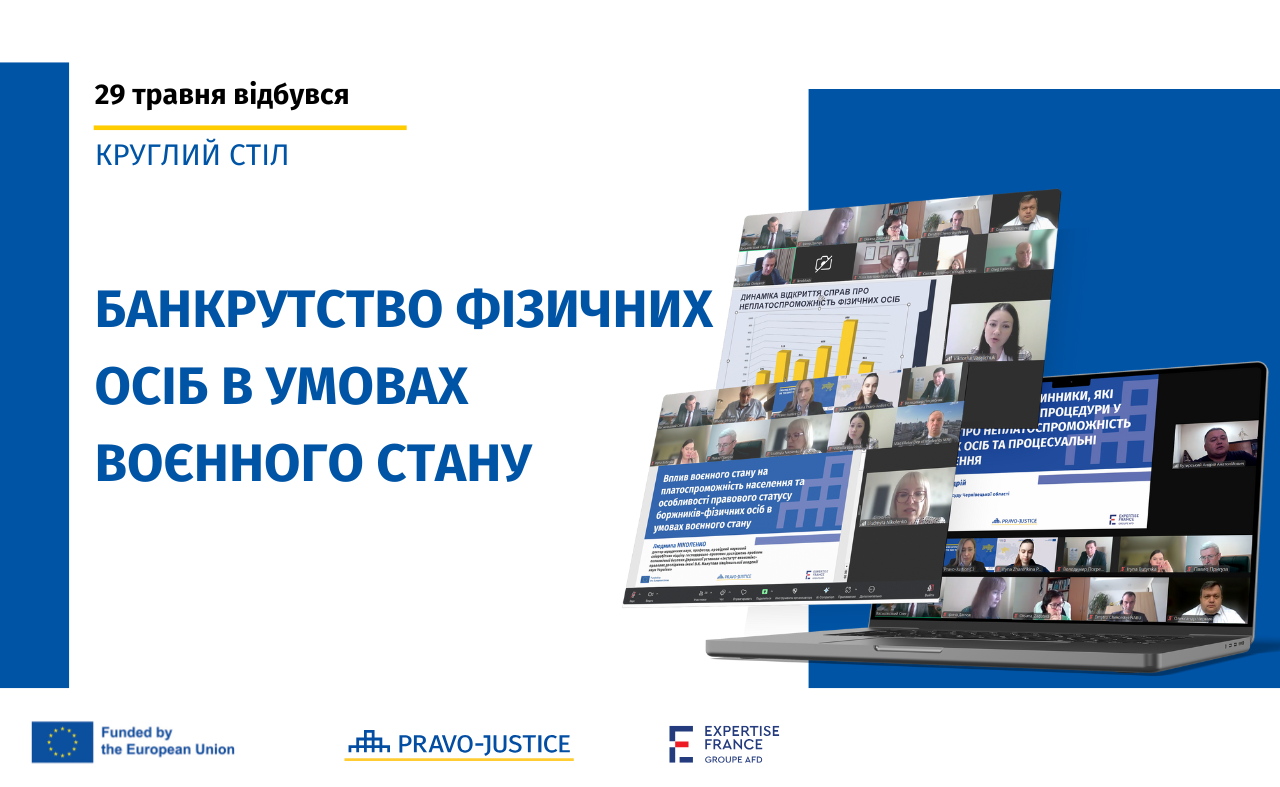EU Project Pravo-Justice Held a Roundtable Event on Individual Bankruptcy in Wartime

On 29 May, EU Project Pravo-Justice held a roundtable event “Individual Bankruptcy in Wartime.” The event brought together representatives from the Ministry of Justice, the Supreme Court, the Ukrainian National Insolvency Trustee Association, the banking community, lawyers, academics, and EU Project Pravo-Justice experts.
The discussion aimed to address practical issues related to bankruptcy procedures applicable to individuals in wartime and to find ways to improve legislation and jurisprudence.
Viktoriia Vasylchuk, Deputy Minister of Justice, emphasised that bankruptcy procedures for individuals in wartime have a primarily social purpose – they are designed to help conscientious debtors become debt-free, preserve their reputation, and come back to active economic life.
“This is a chance the law gives people who openly declare their financial struggles, act according to the law, and are ready to work with everyone involved in the process,” said Viktoriia Vasylchuk.
She also provided information on the dynamics in the application of these procedures. According to the Ministry of Justice, since the entry into force of the Bankruptcy Code of Ukraine (19 October 2019), 3,098 individual insolvency cases have been initiated in Ukraine (432 in 2025 alone, as of May). A total of 1,580 debtors are currently participating in active proceedings, comprising 1,381 undergoing debt restructuring and 199 engaged in debt repayment proceedings.
In turn, Iryna Zharonkina, Enforcement and Protection of Property Rights Component Lead at EU Project Pravo-Justice, provided information on the updated analytical report prepared by the Project experts – “Individual Insolvency in Wartime”. According to her, the increased number of cases, regulatory changes and new categories of debtors called for a comprehensive follow-up analysis. The report analyses over 120 court decisions and contains specific recommendations aimed at improving legislation and law enforcement.
“Since the outbreak of the full-scale invasion, individual insolvency proceedings have faced challenges caused by the war. In particular, new categories of debtors have emerged – internally displaced persons, military personnel and individuals abroad – and their legal status needs to be resolved. The martial law also affects certain components of the insolvency procedure: holding creditors’ meetings, accessing and appraising the debtor’s property, and conducting court hearings,” she explained.
Oleksandr Bondarchuk, Chair of the UNITA Council, emphasised that there is a need for a systematic approach to developing personal bankruptcy. He identified three key areas. The first is raising public awareness of the nature and mechanisms involved in the procedure. The second is simplifying the mechanisms, particularly for vulnerable groups. The third is guaranteeing the remuneration of bankruptcy trustees, who are, in fact, key stakeholders in the procedure.
“By pooling our efforts, we will be able to create an effective system for restoring the solvency of individuals, which will give honest debtors a real chance to overcome financial crises, especially at such challenging times,” said Oleksandr Bondarchuk.
The report on the findings of the research was presented by its authors – Liudmyla Nikolenko, Doctor of Law, Professor, Lead Researcher at the V.K. Mamutov Institute of Economic and Legal Research of the National Academy of Sciences of Ukraine; Andrii Butyrskyi, judge at the Commercial Court of Chernivtsi Region; and Iryna Butyrska, advocate and national expert at EU Project Pravo-Justice.
The roundtable event attendees highlighted that it is vital to keep improving the practical application of individual bankruptcy legislation, particularly in wartime. They also stressed the importance of striking a balance between the interests of debtors and creditors.
The issues covered in the discussion will be summarised in an analytical review of the event, which will also include proposals for legislative amendments and better law enforcement. EU Project Pravo-Justice will draw up the aforementioned analytical review.
Read the updated Analytical Report “Individual Insolvency in Wartime”.